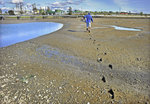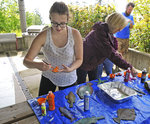

PADILLA BAY, Wash. (AP) — A diverse group of community members who share an appreciation for the region's natural beauty and an interest in protecting it became Salish Sea Stewards this month.
The group that graduated from the course mid-May includes recent retirees, some who are new to the area, and some who are looking to further their academic studies or careers.
With 34 graduates, it is the largest class for the volunteer Salish Sea Stewards program, which is in its fourth year.
"This isn't the end of anything. This is just a stepping off point," Coastal Volunteer Partnership Coordinator Samantha Russell said at the graduation. "What's exciting is what happens next with whatever programs stood out or spoke to you that you want to get involved with."
Over the past 10 weeks, the new Salish Sea Stewards learned about the marine environment, marine wildlife and projects to protect and restore them.
The idea of the Salish Sea Stewards program is to connect those taking part with a variety of projects that rely on volunteers, and to provide the training they need to get involved.
"I thought this would be a great way to engage more in ways that help the marine life and the marine environment in the area," graduate Tom Flanagan of Anacortes told the Skagit Valley Herald while putting his new skills to use on the Fidalgo Bay shoreline.
Russell said 2017 Salish Sea Stewards' have transitioned from education to action. They will all soon spend time on local beaches collecting data, welcoming visitors at the Breazeale Interpretive Center at Padilla Bay and participating in dozens of other projects.
"It's exciting to have a lot of opportunities to pull from," Russell said. "We have a really diverse group of volunteers, so it's great to give them all these different options."
Northwest Straits Commission Chair Nan McKay said in a graduation speech that volunteers working for the health of the Puget Sound and surrounding waters that make up the Salish Sea are more important now than ever.
She said she has worked to protect Puget Sound since 1985 and has seen progress, but is worried about the future because of potential cuts to federal funding and to federal protections for the environment.
"A lot of things we have accomplished over the years are under threat now," McKay said.
Russell said those threats, such as a potential loss of U.S. Environmental Protection Agency funding and less federal attention on climate change may have sparked more interest in the Salish Sea Stewards program this year.
"I think that people have been compelled to act since November," she said. "I wouldn't say the interest in this program is derived solely from that source, (but) I do think it has helped us reach younger individuals."
A DIVERSE GROUP
The 34 new stewards range in age from 13 to 82. Thirteen of them are under 50 — a change from the typical volunteer demographic of retirees.
The youngest new steward, seventh-grader Caden Walker, participated in the training program with his dad Brian Walker.
"I really enjoyed the presentation about different sea life in Puget Sound," said Caden, whose favorite subjects in school are math and science, and who hopes to put his love of kayaking to use this summer doing kelp surveys.
Brian Walker, who works in the wastewater industry, said the program was a good fit for both he and his son.
"I have a fair notion of water quality issues, and Caden has always shown an interest in marine biology, so the Salish Sea Stewards was a really good fit," he said. "We've been really impressed with the quality of education that this program is providing."
Some new stewards, such as 18-year-old Alena Eldridge, were drawn to the program by the education component.
"I'm just really interested in marine biology and the ecology of the Puget Sound area. It was something to further my knowledge," she said.
This fall, Eldridge plans to study oceanography at the University of Washington. She said she was impressed with the way the Salish Sea Stewards program makes local science accessible to anyone.
"I think that especially in the area we live in there are a lot of people that would like to help be advocates for the marine environment, but they don't know how because it can be kind of clinical when you're talking about climate change (and science)," Eldridge said.
Siblings Laurie and Barry Rotner, both recently retired and new to Anacortes, learned more than they expected.
"We came here because of the beauty, the ocean, the water and the trees," Laurie Rotner said. "We really care about the nature and the environment, and we figured that maybe we could help out a little bit."
Barry Rotner said the program taught he and his sister about the importance of forage fish in the food chain and about the potential impacts of invasive European green crabs on the shoreline.
VALUE OF VOLUNTEERS
Several local organizations rely on trained volunteers for a variety of projects.
"We wouldn't be able to do our work without them," Skagit Marine Resources Committee Coordinator Tracy Alker said. "The Salish Sea Stewards training is important because it provides volunteers with a solid background as citizen scientists so that they are well prepared to help."
The volunteers take on tasks government agencies and nonprofits don't have the staff to complete.
"None of our work would be possible without our volunteers," Skagit Fisheries Enhancement Group Riparian Restoration Coordinator Rachel West said. "If we didn't have our volunteers, we couldn't possibly do all the things we need to do with just 12 staff members."
Nonprofits and government agencies often have small staffs because of limited funding.
"The volunteers and the citizen scientists pick up where the funding leaves off," Russell said. "They are going to become more and more important as funding becomes less and less certain."
In 2016, the Coastal Volunteer Partnership managed about 130 volunteers — most of whom are Salish Sea Stewards. Those volunteers contributed about 6,700 hours of service.
That's $73,700 worth of minimum-wage labor and a much higher value based on typical wages for those with science-based college educations.
While volunteers such as the Salish Sea Stewards have become an integral part of marine conservation efforts in the region, McKay recalls a time when volunteers were not trusted to help with government work, particularly if it was scientific.
"We have come light years since then in understanding that you and I, citizens and volunteers, can do this work ... Now we have state agencies that are so thankful to have you working with them," she said to the graduates. "Having you all helping makes a tremendous difference."
RECOGNIZING THE NEED
When a handful of volunteers helped create what is now the Salish Sea Stewards program, they simply felt the program was necessary to educate those who could then volunteer to protect and restore the marine environment, Morty Cohen said.
Cohen of Anacortes and Pete Haase of Bow helped establish the Salish Sea Stewards program after a similar volunteer training program called Skagit County Beach Watchers came to an end in 2012 because of a lack of funding.
Cohen and Haase were part of the final Skagit County Beach Watchers graduating class.
"When we got all enthused it was like, well, it's not going to be anymore, and there were a few of us who really picked up the ball and took it," Haase said.
He said the group felt it was important to have a program focused on the marine environment because the volunteer efforts in the area at the time were focused on freshwater and land-based conservation.
Now dozens of volunteers have received training through the Salish Sea Stewards since the program's start in 2014.
That growing volunteer base plays an important role in monitoring area beaches, ensuring the success of restoration projects and collecting data for new research.
The volunteers also share with the greater community their knowledge of the marine environment and the issues affecting it.
"The Salish Sea Stewards program is a great way to engage the community and empower citizens to become good stewards of the marine environment," Alker said. "The more citizens getting involved in marine conservation, the greater the collective impact."
___
Information from: Skagit Valley Herald, http://www.skagitvalleyherald.com